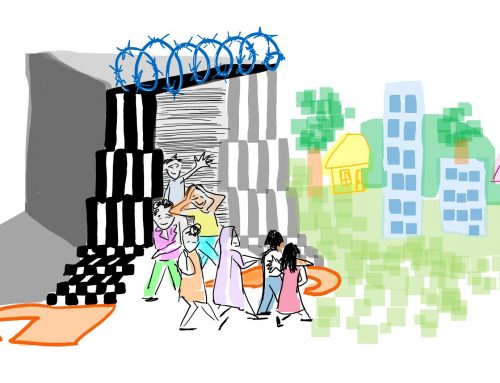Prison Inspectors yet again decry the lack of a time limit on immigration detention – Harmondsworth
Large numbers of migrant men detained indefinitely in prison-like conditions at Harmondsworth Immigration Removal Centre were found to have mental health needs and were considered vulnerable by the Home Office, according to an inspection report published today. Prison Inspectors also criticised, for the third consecutive inspection on Harmondsworth, deteriorating standards of safety and respect for those held inside Europe’s largest detention centre, near Heathrow Airport.
Harmondworth IRC, which detains up 676 migrants, is built to Category B standards and managed by Mitie Care and Custody under the Home Office contract. It is one of the eight long-term residential immigration detention centres in the UK. The UK is the only country in Europe which detains migrants indefinitely without a time limit and practices mass, routine, detention of migrants for administrative reasons. In 2017, a total of 27,331 people entered detention. 53% of people leaving detention were released back into the community.
According to the inspection report, two-thirds of people detained at Harmondsworth felt unsafe. A major reason for this was uncertainty over their immigration cases. Insufficient staffing levels, incarceration in a prison-like environment, stress, frustration and the anger of others detained, drug use at the centre and a recent suicide at the centre were also cited as reasons for feeling unsafe.
There was routine use of handcuffs and strip-search for those taken to the isolation unit which was inappropriate. Those who had appointments outside the centre were also handcuffed, which was described as ‘excessive’ by Prison Inspectors. Mice infestation, endemic bed bugs and dirty and poorly ventilated living areas were also noted.
Prison Inspectors found safeguarding procedures which are supposed to protect the most vulnerable to be wanting in a number of ways. Even with evidence of torture, vulnerable people’s detention was maintained and continued. People’s mental health needs, including post traumatic stress, were not addressed adequately. Potential trafficking victims were not referred to an appropriate channel and unable to receive necessary assistance, as many staff members were unfamiliar with the referral mechanism.
During the previous six months to the inspection, 55 incidents of self-harm were recorded and 218 men were identified as at risk of suicide or self-harm at Harmondsworth. In some cases, support was not provided promptly enough: the Inspection team describes an occasion where they requested a very distressed detained person to be placed on suicide-watch but no support was provided until an hour later when the person was already making a noose.
Repeating again their call for a time limit on the length of detention following their previous Harmondsworth inspection report, Prison Inspectors said they had found it ‘unacceptable’ that 23 men had been detained for over a year at the time of their inspection and one had been detained for four and a half years. It was also revealed that even when the Home Office’s own case progression panel issued recommendations for release, these were frequently refused by other Home Office staff. At the time of inspection, sixty-one per cent of the population at Harmondsworth had been detained for longer than one month.
Eiri Ohtani, Project Director of the Detention Forum said:
‘This is not the first time that Prison Inspectors have slammed the UK government’s policy of indefinite detention without a time limit and it is very unlikely to be the last. They recommended a strict time limit on detention after their inspection at Yarl’s Wood last year, yet there is no sign that the government is prepared to introduce the necessary change.
That the Inspectors found extremely high levels of vulnerability of detained men, including victims of torture, incarcerated at Harmondworth should ring alarm bells to those responsible for the UK’s detention policy. 2017 was the deadliest year in the history of immigration detention with so many deaths: we fear nothing has been done to address this mounting crisis of harm in immigration detention.
While the outcome of Stephen Shaw’s second review into immigration detention remains unknown, there is abundance of evidence that reform is not taking place and detention remains as problematic as ever. We urge the Home Office to promptly and proactively set out its plan to significantly reduce the immigration detention now, starting with a 28 day time limit, ending locking up of vulnerable people and implementation of a wider range of community-based alternatives to detention.’
End.
You can read the Harmondsworth inspection report here. HMIP’s news release about the report is here.





